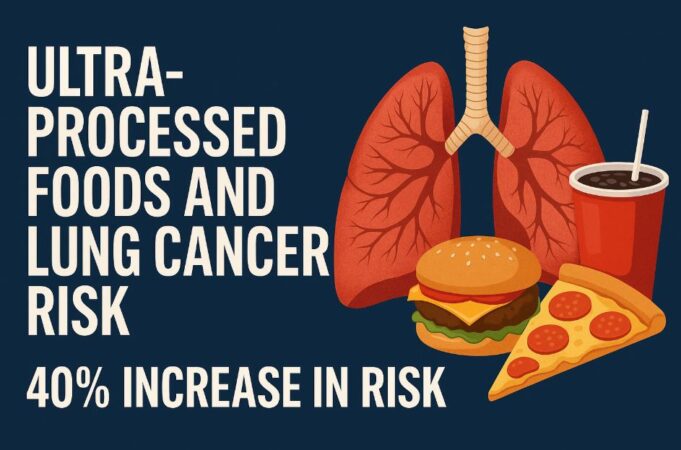A growing body of evidence has linked diet to various forms of cancer, but a recent large-scale study has turned the spotlight onto ultra-processed foods. Researchers now report that individuals who regularly consume items such as pizza, burgers, sugary drinks, and packaged snacks may face a significantly higher risk of developing lung cancer, even if they’ve never smoked.
The Study at a Glance
The research followed over 100,000 American adults, aged around 63, for an average of 12 years. Throughout the study period, nearly 1,706 participants developed lung cancer. Of these cases, 86% were classified as non-small cell lung cancer (NSCLC), while the remaining 14% were small cell lung cancer (SCLC).
Dietary habits were recorded using detailed food questionnaires, which revealed that participants consumed between 0.5 to 6 servings of ultra-processed foods daily. The most frequently reported items included pre-packaged meals, sweetened beverages, lunch meats, and baked snacks.
What the Data Showed
After adjusting for other lifestyle factors, including smoking history and overall diet quality, the results were striking. Those in the highest category of ultra-processed food consumption were found to have a 41% higher risk of developing lung cancer compared to those in the lowest category.
Breaking this down further:
- There was a 37% increased risk for non-small cell lung cancer.
- A 44% higher risk was noted for small cell lung cancer.
Importantly, this association persisted even among individuals who had never smoked, suggesting that diet alone may play a more pivotal role in lung cancer development than previously understood.
Limitations and Considerations
It’s important to note that this was an observational study. While it establishes a strong association, it does not prove that ultra-processed foods directly cause lung cancer. Other limitations include the lack of detailed data on smoking intensity and the fact that dietary habits were assessed only once, at the beginning of the study.
However, the sheer size and scope of the study add weight to the findings and highlight an urgent need for further investigation into the long-term effects of processed food consumption.
A Broader Public Health Concern
Ultra-processed foods are a staple of modern diets. They’re convenient, cheap, and heavily marketed, but they may come at a cost to health that’s only now becoming fully understood. The researchers behind the study argue that reducing global reliance on ultra-processed food could potentially help lower the incidence of lung cancer and other diet-related diseases.
As awareness grows, the conversation around cancer prevention is shifting beyond smoking and air pollution to include everyday food choices.













